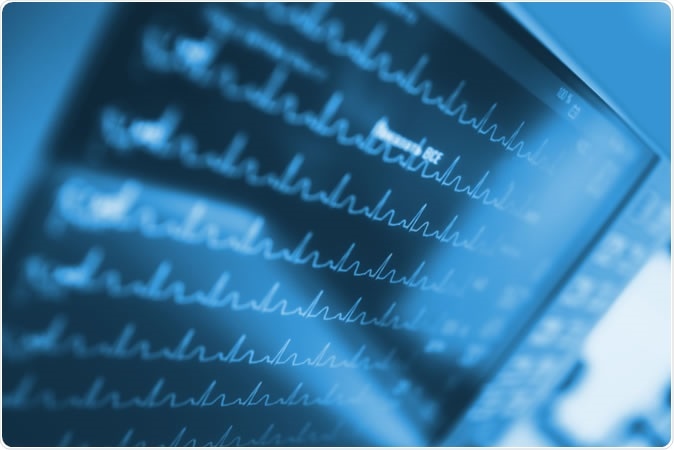A new study published on October 17, 2019, in the journal EP Europace, shows that people who drink alcohol almost every day, even in small amounts, are more at risk to develop an irregular heart rhythm called atrial fibrillation (AF), which is linked to a five-fold higher risk of stroke. This overturns current medical advice to reduce the absolute amount of alcohol consumed rather than the frequency of drinking, and indicates the importance of telling drinkers the need to drink less often, and not just lower amounts.

Drinking small amounts of alcohol frequently is linked with a higher likelihood of atrial fibrillation than binge drinking. Image Credit: sfam_photo / Shutterstock
What is atrial fibrillation?
Atrial fibrillation is a common irregularity of the heart rhythm. The right atrium, or right upper heart chamber, is the location of the heart’s pacemaker, the site at which the electrical impulse responsible for each heartbeat originates. The effect of this orderly stream of impulses is the normal synchronized orderly wave of contraction and relaxation of the sheet of muscle that makes up the right atrial wall, and that pumps blood out of the chamber into the right ventricle. AF can occur in the left atrium too. AF is triggered by stress, fatigue, dehydration, intense physical exertion, and alcohol use.
AF refers to the wriggling movement of the right atrial wall, and is caused by uncoordinated contraction of the muscle sheet. This irregularly timed and ineffective contraction pattern causes blood to stagnate inside the chamber, and therefore to clot. The clot eventually breaks off. In this case, if the right atrium is involved, the chunks of clotted blood hurtle down the pulmonary artery and its branches, until the vessel diameter grows too narrow, at which point they are stuck. In the case of left atrial fibrillation, the clot travels down the aorta and its branches.
In either case, the traveling clot blocks circulation further downstream, producing complications that vary with the organ in which the obstruction occurs. The most commonly affected are the lungs, in pulmonary embolism, the heart, in heart attacks, and the brain, in ischemic embolic strokes. The symptoms of AF include palpitations, irregular or racing pulse, and if pulmonary embolism occurs, chest pain, tiredness and dizziness.
Earlier research
The study builds upon an earlier piece of research which showed that alcohol drinking was positively connected to AF, with an 8% increase in the risk of the latter with each 12g increase in the weekly consumption of alcohol. However, that meta-analysis could not clearly state whether the increased risk was due to the increased amount of alcohol consumed, or the increased frequency of drinking.
The study and its outcomes
The current study aimed to answer this question by comparing individuals who drank frequently with those who indulged in binge drinking. The researchers looked at almost 9,776,956 people who did not have AF at the time of study, in 2009. At that time, they had taken part in a nation-wide health surveillance, including questions on drinking alcohol. These individuals were then kept in follow-up for AF until 2017.
The researchers found that new AF occurred most often who drank the most frequently. In this study, those who drank two times a week were treated as the control or reference population. Compared to them, the group that drank every day had a 42% increased risk of new-onset AF, while those who drank once a week had a 10% reduction in the risk. On the other hand, binge drinking behavior was not clearly associated with either increase or decrease in the risk.
When related to absolute increase in consumption, new-onset AF increased by 2% for each 1g/week increase in alcohol consumption. When classified by consumption amounts, non-drinkers had an risk increase of 8.7%, while moderate drinkers and high drinkers showed a 7.7% and a 21.5% increase, respectively, in the risk of AF compared to those with a mild drinking habit. However, the researcher Jong-Il Choi cautions against prematurely assuming the virtue of mild drinking, saying it must be confirmed first. He says, “It is not clear if this is a true benefit or a confounding effect of unmeasured variables.”
The increased risk in the group that drank most frequently was seen irrespective of age and sex differences. Thus this is the major risk factor for stroke associated with drinking, rather than binge-drinking.
Choi says, “Repeated episodes of atrial fibrillation triggered by alcohol may lead to overt disease. In addition, drinking can provoke sleep disturbance which is a known risk factor for atrial fibrillation. Atrial fibrillation is a disease with multiple dreadful complications and significantly impaired quality of life. Alcohol consumption is probably the most easily modifiable risk factor. To prevent new-onset atrial fibrillation, both the frequency and weekly amount of alcohol consumption should be reduced.”
Journal reference:
Yun Gi Kim, Kyung-Do Han, Jong-Il Choi, Ki Yung Boo, Do Young Kim, Kwang-No Lee, Jaemin Shim, Jin Seok Kim, Young-Hoon Kim, Frequent drinking is a more important risk factor for new-onset atrial fibrillation than binge drinking: a nationwide population-based study, EP Europace, , euz256, https://doi.org/10.1093/europace/euz256